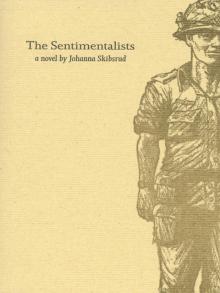- Home
- Johanna Skibsrud
Quartet for the End of Time
Quartet for the End of Time Read online
QUARTET FOR THE END OF TIME
ALSO BY
JOHANNA SKIBSRUD
—
This Will Be Difficult to Explain and Other Stories
The Sentimentalists
CONTENTS
I. Sutton: Riot on the Mall
II. Douglas: On the March
III. Alden: Underground
IV. (INTERLUDE)
V. Douglas: The Bonus Trail
VI. Sutton: On the Warpath
VII. Alden: Cracking the Code
VIII. Awaiting Trial
Acknowledgments
Art Title Index
Sources and Inspirations
As a musician I studied rhythm. Rhythm is, in essence, alteration and division. To study alteration and division is to study Time. Time—measured, relative, physiological, psychological—is divided in a thousand ways, of which the most immediate for us is a perpetual conversion of the future into the past. In eternity, these things no longer exist. So many questions! I have posed these questions in my Quartet for the End of Time.
— OLIVIERMES SIAEN
QUARTET FOR THE END OF TIME
I.
Sutton
RIOT ON THE MALL. THE JUDGE’S HOUSE, DISTRICT OF COLUMBIA COURTHOUSE, CAMP MARKS, WASHINGTON, D.C., JUNE–JULY, 1932—WITH A BRIEF DETOUR TO THE DISTRICT OF COLUMBIA COURTHOUSE, 1928.
It was her mother who accompanied Sutton to her father’s door. Who stood beside her, hand raised and trembling, before she finally brought it down: knocking, sharply, twice. Who, in response to her husband’s voice, which echoed from inside, touched her daughter lightly on the shoulder, as though in sympathy for something that she couldn’t name, then stepped aside to let her pass.
It was the afternoon following the riots; Alden had not yet returned, and the household had been thrown into turmoil of a rare sort—her mother’s incursion beyond the limit of her own quarters was certain evidence of this. And now, inexplicably, the Judge wished to speak to her. She was to listen very carefully, her mother warned, and do as she was told. This was counsel that could, in itself, have hardly been deemed unusual—except that it went without saying in the Kelly house. When the Judge spoke, there was never any choice but to listen. Of all people, it was her mother who should have known that. Sutton had, therefore, no idea what sort of man to expect in her father’s room, now that the remarkable idea had been introduced—if in the negative—that her father was a man whom she conceivably might not listen to or obey.
What drew her attention immediately, however, upon first entering, was not anything out of the ordinary with her father himself (he appeared very much as he always had, sitting upright behind his desk in his straight-backed chair), but a hat. A man’s hat. Rather sad and misshapen-looking, it sat, incongruously, on her father’s desk. A hat on the table, as the Judge himself had taught her, was a very definite sign of bad luck. It was an old cowboy code, a tradition the Judge prided himself in having inherited—though, truth be told, the Kellys themselves had never been actual cowboys. They were wheat farmers from Indiana. The Judge kept an old riding whip anyway as proof of his midwestern pedigree. It lay coiled in his desk’s thin middle drawer, and from time to time he would take it out and flick it back and forth with a repetitive twist of his wrist, making, as he did so, a swishing sound that could be heard through the house. They always knew when the Judge was in a meditative mood because of it. It never failed, he said—that particular rhythm, and the accompanying sound the whip made as it cut through the air—to soothe him, and help him to think. Perhaps, as he reflected on more than one occasion, it was due to being reminded through the object’s weight and the steady rhythm of it in his hand, of its great and complicated history—which, by extension, was also his own. As a child, Sutton had marveled over the multitude of various conflicting details that surrounded the object, and it had taken her many years to realize what it meant that—on the subject of the whip—her father never told the same story twice.
NOW, HOWEVER, THOUGH THE Judge had taken the whip from its drawer, he merely fingered its rough leather absently. Only occasionally did he allow it to twitch, restlessly, as if more or less of its own accord, in his hand.
In any case, it was not her father’s whip, but the hat, which held Sutton’s attention as she entered her father’s room.
Why on earth, she wondered, had he not only let it remain on the table, but seemed to have deliberately placed it there? It seemed quite pointless, she reflected (and she could only assume that, on this count, the Judge himself would agree—it was only according to his “code,” after all, that she considered the matter), to go about knowingly courting ill fortune in this or any other way—even if one was (as the Judge himself, despite any Romantic allusions, surely was) the very opposite of a superstitious man. Things don’t just happen, he had told her and Alden on she didn’t know how many countless occasions. You make them happen.
BEHIND HIS DESK, JUDGE KELLY was sitting very upright, indeed. It was the same posture he assumed while marching in the parade every Fourth of July. (A former colonel, the Judge had been heavily decorated for his service—particularly during the Banana Wars, where he had helped to quell the March riots back in 1911.) As Sutton entered, he cleared his throat and sat more upright still.
He hoped—he said quickly, waving her toward the empty chair opposite his large, low desk, where she was to sit—she had not been too much disturbed by recent events.
Sutton sat. She shook her head.
No, she had not.
But the Judge had hardly paused long enough for a reply.
Now, look, he was saying. Your brother. He’s gone ahead and gotten himself tangled up with all of this somehow. As usual with him, it’s just a case of having found himself in the wrong place at the wrong time— something that’s become almost like a habit with him. But see now, if we aren’t careful in this particular case …
Here the Judge paused. He cleared his throat, and—distracted suddenly—looked up to where an empty chandelier hook, upon which nothing, as far as Sutton was aware, had ever hung, marked the exact center of the high ceiling. Almost absently, as he did so, he extended a hand toward the hat. Then his eyes descended, meeting—for the briefest of moments—Sutton’s own.
A great many things, he said, his eyes fixed firmly now on the hat between them (as though, indeed, it were to the hat, and not to his daughter, he spoke), are held in balance by a very few. This is something that may be difficult for someone of your age to understand—but that is not the most important thing. The more important thing now, he said (still as though to the hat), is to establish that you and I both have in this case … a certain … responsibility.
He looked up now, flickeringly, this time without meeting his daughter’s eye.
Let’s go back, he said. To just around this time yesterday afternoon—
But Sutton’s heart had begun to beat here so unnaturally fast that— though it was a very simple one—the Judge was forced to repeat his question twice before she heard.
Sutton, the Judge said again. I’m asking you. Where were you? Yesterday afternoon?
It was only according to a tremendous effort that she was able to reply.
Here, she said, finally. In a small voice, hardly her own.
IT WAS TRUE. As the noise had drifted from the Mall, Sutton had remained with her mother indoors—only once venturing out to the yard, where she heard the scream of sirens and exchanged a few words with the neighbor, who was just at that moment passing in front of their house to his own. Everything had just “gone wild,” Mr. Heller had said—taking unconcealed pleasure in being able to pass on the news. The veterans had stormed the White House, and he—Mr. Heller�
��would not be surprised if a Communist flag was flying there now. Anyone could have seen it coming, he concluded dolefully, shaking his head and continuing past.
Shortly after, the Judge telephoned. They shouldn’t wait dinner, he said. But, no, no—everything was all right.
Sutton could hear his voice through the receiver, which her mother held at an angle, away from her ear. Everything would be cleared up in no time now, he said. Look at it this way. This may be just the break we need. They’ve called in the Army. Now the whole thing is certain to be over and done with—and soon.
A pause, then: Where’s Alden? With you?
Alden had not been seen since late morning, when, after rising late as usual, he had eaten breakfast alone, then—giving his mother a kiss on the forehead—headed for the door. He hadn’t said where he was going; he never did.
No, Alden was not with them, Mary Kelly said, her voice rising. They hadn’t seen him, she said, but here she paused. She could hardly think. Her eyes flitted nervously about the room. Since—when?
Sometime just before noon, Sutton said. Mary repeated the information. Stephen’s voice came back sounding flat and mechanical through the line.
Well, not to worry, he said. The Mall’s almost clear. Even if he made it down that far, he’ll be home before long.
Then, without signing off, as was his habit, the Judge hung up the phone.
SUTTON WATCHED AS HER mother set the receiver down.
Well, that’s all right, then, Mary Kelly said loudly, as though someone might disagree. Then she went into the kitchen and fixed herself a pot of tea. By that time it had become very still and quiet. There was no noise to be heard from the direction of the Mall or anywhere else. All the houses in the neighborhood, including the Hellers’ next door, were shut tight.
As they waited, the hours lengthened. Now and then—in order to interrupt what seemed their interminable flow—her mother would get up and turn in a slow circle. Was Sutton quite comfortable? she would ask. Did she need anything? When Sutton replied that she was quite all right, as she did every time, her mother would press a hand to her head. Oh, the headache of it, she would say. The very multipurposeness of this expression—which, for as long as Sutton could remember, had been employed by her mother just as readily in the most innocuous of circumstances as in the most acute—served to comfort them both. Once or twice its effect was augmented by something of a more material nature when Mary Kelly slipped away to the medicine cabinet at the back of the house, within which she kept a cure for just about anything you could think to complain of—and even some mysterious conditions you didn’t know, until you were cured of them, you actually had. The bedroom, and its cabinet, was a further extension of her quarter of the house. It had been known as the “guest bedroom” until gradually Mary herself became its permanent “guest.” Now they called it the “back room.” Never “Mary’s,” or “Mother’s” room—though she not only slept there nightly, but also spent most of the late afternoons there, up to four hours at a time, the door shut tight.
Now, after each disappearance, she would return, looking momentarily refreshed, and say, Well, that might be some help. Are you sure you’re doing all right?
Each time, Sutton assured her she was. But not an hour would go by before her mother would disappear once more—to fix tea, though neither one of them required it, or to go look up in the telephone directory the number of the police dispatcher, or the family doctor, just to have them “on hand.”
FINALLY, THE TELEPHON ERANG AGAIN. It was the Judge. Both Sutton and her mother got up and listened into the heavy handle of the phone, which the older woman once again held away from her ear.
Now—the Judge hesitated—I don’t want you worrying over nothing, but, see, there’s been some—slight—trouble, which I’ll need to look into. Alden—now, look, he’s all right. It’s taken care of, see. Now, you just turn in—don’t wait up. Alden’s here. With me. Like I told you—everything’s all right.
WELL, THE JUDGE SAID after Sutton had recounted all of this to him— her heart still beating wildly for some reason, though there was nothing in it the Judge would not have already known—that’s good, very good. Because—he gave her a quick, decisive nod—it’s the truth. I’ve no doubt of it.
Sutton’s cheeks were cooling now, her heart beginning to slow to its more regular pace.
It is best—the Judge went on—as I have always maintained, to tell the honest truth, whenever it is possible to do so.
There was something new, now, Sutton noticed, in her father’s voice. At first she found it difficult to place, but then—she remembered. It was the same voice she had heard him use on the one occasion she had seen him preside in a court of law. Both Alden and she had been in attendance, accompanied by their mother. She herself could have been no more than ten—Alden, twelve or thirteen. They had sat at the back, and left as soon as the proceedings were over—their mother’s hand ushering them out the door before anyone else had yet risen.
It had been a simple open-and-shut case, the Judge had told them— they knew even before it was over what the verdict would be. What else could it have been? A Negro, in the process of holding up a hardware store, had fired a gun and mortally wounded the wife of the store’s proprietor. He had confessed to the deed without hesitation—pleading only that the crime had been unmeditated, resulting from the confusion of the holdup. The prosecution had argued, to the contrary, that the crime had been malicious in intent: that the young man in question was of “underdeveloped” character and would continue to prove a certain and perpetual danger to society.
Are these the sorts of “accidents” to which we would like our city streets prone? Accidents, ladies and gentlemen! the prosecutor had shouted. Nothing happens out of the blue—on its own, and for no reason!
Then an exhausted-looking woman, in whose house the young man had once been employed, testified that on several occasions she had feared for her virtue in the company of the young man. At the time, the word virtue, used in this particular context, had confused Sutton, but she knew enough not to ask her mother about it—that it was something that had, for good reason, been left undefined.
In the end, the maximum penalty was served: death by hanging. Sutton felt her blood thrill suddenly in her veins as the verdict was read. A murmur rippled through the crowd. There was no time to observe the reaction more closely, however—or assess her own. Her mother was already pulling her up by the hood of her spring coat and ushering her out the door. What was it within her that had thrilled at the mention of the accused man’s demise? Now, as she listened to her father speak— that same note ringing out in his voice as the one she had heard all those many years before—she tried to recall it: the particular dimensions of the sensation she had felt at that moment as the verdict was read. It seemed it was almost possible—that it was a thing that might, after all, prove measurable. But still she could not ascertain the slightest thing about it—where it had come from, and what it meant to have found it so suddenly within her own body.
Later that evening she overheard her mother speaking sharply to her father.
That was hardly a suitable case for children, Stephen, her mother had said. If I’d known— But Sutton never was to find out what it was her mother might have, but had not known, because her father ended the conversation abruptly.
Mary, he had said. Justice is justice! There’s never a time where that is not observable, even—or especially—by the very young.
SOME HOW, THAT PHRASE —her father’s voice, and those words, beginning with her mother’s name—became inseparable for Sutton from the memory of the accused man’s face, as he had stood quavering on the stand. It was perhaps the first time she had looked, for any extended period of time, into the face of a black man. She was fascinated by the way the whites of his eyes stood out in such sharp contrast against his dark skin. Even from that distance, in the back row, wedged between her mother and brother, she could see the way his eyes, when the verd
ict was read out loud in her father’s voice, darkened slightly. They did not flash in alarm, or in fact move at all, but somehow there was a change—and she had witnessed it. It was that change to which the words her father spoke later, beginning with her mother’s name, seemed, afterward, to cohere. An almost unseen darkening of a stranger’s eye. And it was that which was somehow evoked for her again as her father pronounced those words—the honest truth—so many years later.
Never again after that was she to see her father preside in court. Not only because of her mother’s sense that the case they’d observed had not been “suitable,” but because, shortly afterward, her father was elected to Congress. From then on, he was a government man—the work that he did even more mysterious and difficult to understand.
THE REARE, OF COURSE, her father was saying, exceptions to every rule. Times when it simply is not possible to tell the truth in the way we ordinarily would be expected—would, that is, expect ourselves to do. Times when, indeed, telling what might at first appear to be a stretch of the truth actually corresponds more accurately with the truth than the truth itself.
The Judge paused—only very slightly. Into this pause Sutton nodded slowly, her lips pressed into a tight line. She fixed her gaze, not on her father’s face as he spoke, but again on the space between them— occupied by the hat.
The nod, though slight, sufficed; the Judge answered it with his own.
Sometimes, he continued, following her gaze and touching the hat gently, as if almost by accident, it is in fact the exceptions to the rule that constitute the strength of the rule itself. Because it is against these—but here, again, he paused. Abruptly, he withdrew his hand from the hat.
Is this something, he interrupted himself, you think you can understand? Because it is very important, he went on, that you do. Important for your brother, yes, but more … particularly … for your mother. You know—again he hesitated, peering at his daughter over his spectacles, which he had only recently begun to wear. She isn’t always in the most … perfect health.

 Island
Island Tiger, Tiger
Tiger, Tiger Quartet for the End of Time
Quartet for the End of Time This Will Be Difficult to Explain and Other Stories
This Will Be Difficult to Explain and Other Stories The Sentimentalists
The Sentimentalists